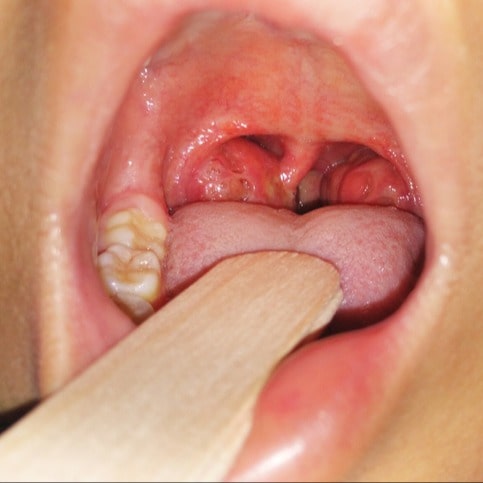Tonsillectomy surgery for adults and children
What is tonsillectomy in adults and children?
 Tonsillectomy is a surgical procedure that involves removing the tonsils, which are small lymphoid formations located on either side of the palate at the back of the throat. This procedure can be performed in adults and children and aims to treat a variety of health conditions.
Tonsillectomy is a surgical procedure that involves removing the tonsils, which are small lymphoid formations located on either side of the palate at the back of the throat. This procedure can be performed in adults and children and aims to treat a variety of health conditions.
What are the common reasons for tonsillectomy?
Tonsillectomy in children:
Tonsil infections are common, especially chronic tonsillitis.
Enlarged tonsils can cause breathing or swallowing problems.
Swelling or sleep apnea associated with the tonsils.
Tonsillectomy in adults:
Multiple tonsillitis.
Swelling or sleep apnea associated with the tonsils.
Tonsil tumors or conditions requiring examination or treatment.
How does the surgery take place?
Tonsillectomy surgery is usually performed under general anesthesia. The tonsils are carefully removed by the surgeon to reduce bleeding and complications.
What is the duration of the intervention?
The procedure generally lasts 10 to 20 minutes.
What are the surgical consequences?
The operative consequences of tonsillectomy may vary depending on the individual cases and the techniques used. Here is some general information on the surgical consequences of tonsillectomy:
After surgery, patients may feel pain or discomfort in the throat, ears and mouth.
Patients may also experience difficulty swallowing, a hoarse voice, or a mild fever.
Patients should avoid hot, spicy, sour, or dried foods for 10 days after surgery.
Patients should also avoid foods that could irritate their throat, such as toast, crackers, tomatoes, orange juice and lemonade.
Patients should drink plenty of fresh water and dairy products to avoid dehydration.
Patients should follow a specific diet, such as a soft or liquid diet, for the first few days after treatment. operation.
Patients should rest and avoid strenuous physical activities for at least one week after surgery.
Patients should stay home for at least seven days after surgery to avoid infections and bleeding.
Patients should discuss medications to relieve pain and discomfort with their doctor.
Patients should also discuss signs of post-operative complications, such as excessive bleeding, fever, with their doctor. high or difficulty breathing.
Patients should follow their doctor's instructions for post-operative care, such as cleaning their mouth and the throat.
Patients should discuss the risks and benefits of tonsillectomy with their doctor before the procedure.
What are the advantages ?
In children, tonsillectomy can be performed to treat recurrent bacterial tonsillitis or chronic tonsillitis, hypertrophy of the tonsils, snoring and/or sleep apnea.
In adults, tonsillectomy can be performed to treat recurrent tonsillitis, peritonsillar abscesses, enlarged tonsils, snoring and/or sleep apnea.
Tonsillectomy can relieve symptoms associated with tonsil infections, such as pain when swallowing, fever, hoarse or nasal voice, runny nose or ear infection.
Tonsillectomy can improve patients' quality of life by reducing symptoms associated with sleep disorders, such as fatigue, dark circles and mouth breathing.
Tonsillectomy may reduce the risk of complications associated with tonsil infections, such as peritonsillar abscesses.
What are the risks ?
Risks and possible complications of tonsillectomy include:
Hemorrhage: this is the main post-operative risk of tonsillectomy, which can occur for up to two weeks after the operation. Patients should report any bleeding of red blood from the nose or mouth to their surgeon immediately.
Pain: Patients may feel pain or discomfort in the throat, ears, and the mouth after the operation.
Difficulty swallowing: Patients may experience difficulty swallowing after surgery.
Fever: Patients may have a slight fever after surgery.
Hoarse voice: Patients may have a hoarse voice after surgery.
Fluid reflux through the nose: Patients may experience fluid reflux through the nose when drinking from the immediate consequences of the intervention.
Burning or chapping on the lips: Patients may have burning or chapping on the lips after surgery.
Dehydration: Patients should drink plenty of fresh water and dairy products to avoid dehydration.
Infection: Patients may develop an infection after surgery.
Other rare complications: Other rare complications of tonsillectomy include breathing problems, allergic reactions to anesthesia , damage to teeth or surrounding tissues, blood clots, pneumothorax and respiratory tract infections.
How is recovery going and how long does it last?
Recovery after tonsillectomy can vary depending on individual cases and the techniques used. Here is some general information about recovery after tonsillectomy:
A convalescence of 5 to 10 days should be planned.
Patients may experience pain or discomfort in the throat, ears, and mouth after the operation.
Patients may also experience difficulty swallowing, a hoarse voice, or a mild fever.
Patients should avoid hot, spicy, sour, or dried foods for 10 days after surgery.
Patients should also avoid foods that could irritate their throat, such as toast, crackers, tomatoes, orange juice and lemonade.
Patients should drink plenty of fresh water and dairy products to avoid dehydration.
Patients should follow a specific diet, such as a soft or liquid diet, for the first few days after treatment. operation.
Patients should rest and avoid strenuous physical activities for at least one week after surgery.
Patients should stay home for at least seven days after surgery to avoid infections and bleeding.
Patients should discuss medications to relieve pain and discomfort with their doctor.
Patients should follow their doctor's instructions for post-operative care, such as cleaning their mouth and the throat.
Patients should discuss signs of post-operative complications, such as excessive bleeding, high fever, with their doctor or difficulty breathing.
Patients should discuss the risks and benefits of tonsillectomy with their doctor before the procedure.
Recovery time may vary depending on individual cases and techniques used. Patients should discuss the details of the procedure and post-operative care with their doctor before surgery.